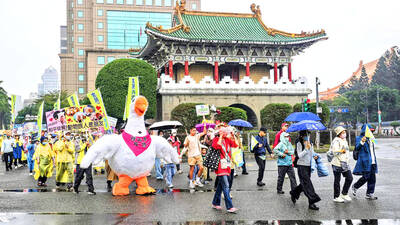A US professor is urging US President Barack Obama to make a deal with Beijing over the sale of advanced F-16 fighter planes to Taiwan.
“The warplanes should be used as bargaining chips,” said Missouri State University political science professor Dennis Hickey in an article published this week in the Los Angeles Times.
The article appeared on the eve of Obama’s departure on a four-nation tour of Asia, beginning yesterday, that will include two days in China and incorporate direct talks with Chinese President Hu Jintao (胡錦濤) that are certain to touch on US arms sales to Taiwan.
While the official agenda may be dominated by efforts to resolve the global financial crisis, climate change and nuclear proliferation in North Korea, Hickey said that most analysts agree that Beijing’s primary concern would be Washington’s continued military support of Taiwan.
In particular, the Chinese are known to strongly oppose Taiwan’s request for 66 upgraded F-16 fighters.
“Obama should not bow to Chinese pressure and scuttle the idea of F-16 sales,” Hickey wrote.
He said that the administration ought to explore the possibility of agreeing to a deal similar to that proposed by former Chinese president Jiang Zemin (江澤民) to former US president George W. Bush in 2002.
“The US should agree not to sell advanced fighters to Taiwan in exchange for the removal of the 1,500 ballistic missiles that China has deployed directly opposite Taiwan,” he said.
“Such an initiative could yield numerous dividends,” Hickey said.
He said that Beijing would seriously consider the proposal because it would generate goodwill in Taiwan.
It would also provide Taipei with tangible evidence that its policy of cooperation and conciliation with China is working.
“The current leaders would be able to more easily move forward with other measures aimed at rapprochement and enhance their prospects for re-election,” the professor said.
He pointed out that US officials have long emphasized that arms sales to Taiwan can serve as a stabilizing factor in East Asian affairs.
But in this instance, he said, the sale of high-profile F-16s would jeopardize relations with Beijing, undermine core US interests and help spark an arms race across the Taiwan Strait.
Hickey concluded: “If Washington uses the prospect of dropping such sales as a bargaining chip to persuade China to remove the missiles, it would help reduce cross-strait tensions, pave the way for closer Sino-American relations and promote peace and stability in the western Pacific.”
“The choice should be obvious,” Hickey said.

NUMBERS IMBALANCE: More than 4 million Taiwanese have visited China this year, while only about half a million Chinese have visited here Beijing has yet to respond to Taiwan’s requests for negotiation over matters related to the recovery of cross-strait tourism, the Tourism Administration said yesterday. Taiwan’s tourism authority issued the statement after Chinese-language daily the China Times reported yesterday that the government’s policy of banning group tours to China does not stop Taiwanese from visiting the country. As of October, more than 4.2 million had traveled to China this year, exceeding last year. Beijing estimated the number of Taiwanese tourists in China could reach 4.5 million this year. By contrast, only 500,000 Chinese tourists are expected in Taiwan, the report said. The report

Temperatures are forecast to drop steadily as a continental cold air mass moves across Taiwan, with some areas also likely to see heavy rainfall, the Central Weather Administration (CWA) said. From today through early tomorrow, a cold air mass would keep temperatures low across central and northern Taiwan, and the eastern half of Taiwan proper, with isolated brief showers forecast along Keelung’s north coast, Taipei and New Taipei City’s mountainous areas and eastern Taiwan, it said. Lows of 11°C to 15°C are forecast in central and northern Taiwan, Yilan County, and the outlying Kinmen and Lienchiang (Matsu) counties, and 14°C to 17°C

STEERING FAILURE: The first boat of its class is experiencing teething issues as it readies for acceptance by the navy, according to a recent story about rudder failure The Hai Kun (海鯤), the nation’s first locally built submarine, allegedly suffered a total failure of stern hydraulic systems during the second round of sea acceptance trials on June 26, and sailors were forced to manually operate the X-rudder to turn the submarine and return to port, news Web site Mirror Daily reported yesterday. The report said that tugboats following the Hai Kun assisted the submarine in avoiding collisions with other ships due to the X-rudder malfunctioning. At the time of the report, the submarine had completed its trials and was scheduled to begin diving and surfacing tests in shallow areas. The X-rudder,

DEMAND: The government should enact regulations in line with Austria and Germany to incorporate vegan nutrition into school meals, an advocate said More than 1,000 people yesterday marched in Taipei to promote veganism, calling for legislation to incorporate vegan diets into school lunches and the national net zero emissions program. Participants gathered on Ketagalan Boulevard in front of the Presidential Office Building for the march, which was organized by the Vegan Action Network (VAN). Former ambassador to Chad Chiu Chung-jen (邱仲仁), actor Yankee Yang (楊子儀) and actress Cindy Lien (連俞涵) attended the event. VAN member Marianne Chao (趙梅君) said that the campaign aimed to urge the government to promote vegan diets across schools and government agencies via legislation and national policies, which would help build